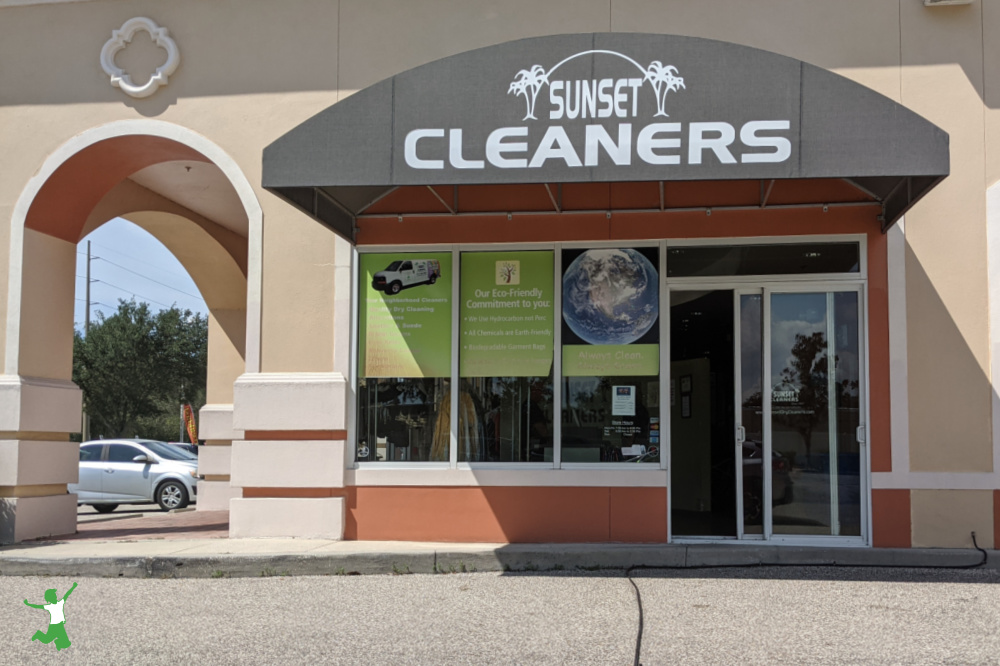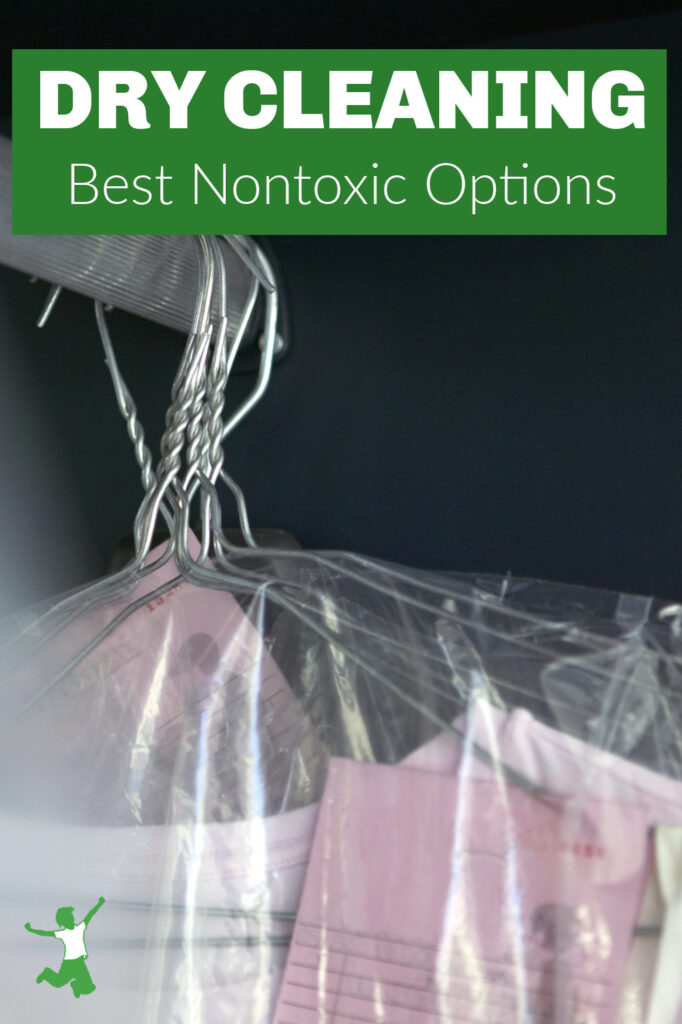Options for safe, green dry cleaning of clothes, bedding, curtains, and other hard-to-clean items that are nontoxic and completely free of solvents and other hormone-disrupting chemicals.

Dry cleaning is big business in developed nations around the world.
According to Proctor and Gamble, the average woman spends about $1500 per year on dry cleaning thanks to the pink tax. (1)
Even more surprising, 65% of clothes that are dry cleaned are actually machine washable!
Most consumers don’t give a second thought to how their clothes are dry cleaned or what chemicals are used. It is also often overlooked that recycling dry cleaning hangers is an easy step consumers can take to reduce waste in the industry.
Dry Cleaning Solvents
The overwhelming majority of dry cleaning businesses use perchloroethylene or tetrachloroethylene (PERC or PCE), a solvent and probable carcinogen.
Dry cleaners love these solvents because they clean delicate fabrics without shrinking or fading.
These chemicals linger on clothes for hours or even days after the customer has taken the dry cleaned clothes home.
The practice of enclosing the finished garments in plastic further encourages the retention of residual PERC/PCE in the clothing fibers.
Vapors are then released into the air of your home when you remove the plastic and put the clothes into your closet.
You can be breathing solvent vapors in your bedroom while you are sleeping and not even realize it because PERC/PCE are odorless once evaporated.
Short-term symptoms from exposure include dizziness, fatigue, headache, and sweating.
Lack of coordination and unconsciousness are also possible.
Long-term exposure can cause kidney and liver damage and is a probable cancer risk. (2, 3)
PERC has a very strong and fresh-smelling scent. Because it is not off-putting, many people don’t give it a second thought.
You’ve probably gotten a whiff of it before while removing the plastic bag from your newly dry cleaned clothes.
Remember that once evaporated, your nose cannot detect it. So, smelling nothing does not mean these solvents are gone!
Reducing Exposure to PERC
Once you realize the danger of dry cleaning solvents, the next step is to reduce or eliminate exposure completely.
Here are a few strategies to consider and implement if they work for your situation.
Dry Clean Fewer Clothes
The first and most obvious way to cut your exposure to toxic dry cleaning solvents is to dry clean fewer clothes.
Given that 65% of the clothes dry cleaned by the average woman could, in fact, be machine washed provides ample room for an immediate and significant reduction in exposure.
Remove Plastic Outside
A second way to cut your exposure is to unwrap your newly dry cleaned clothes outside.
Let them hang in the fresh air or garage for a few hours before bringing them inside and placing them in your closet.
Unwrapping them in the house is NOT a good idea, as vapors will be released and can linger for up to a week!
Call Health Department
If you work or live in a building that houses a dry cleaning business, call the local health department to check on PERC or PCE levels in the air.
Dry cleaning solvents have been known to seep into nearby apartments and offices, contaminating the air.
Get Air Filters
If you live in such a situation, it is a good idea to invest in HEPA air filters (1 unit for every 500 square feet) to ensure your indoor air is safe for breathing.
This is a good idea anyway as there are many more volatile organic compounds (VOCs) besides PERC and PCE that can contaminate indoor air.
What About At-Home Dry Cleaning Sheets?
One option some people are switching to is home dry cleaning.
This method involves purchasing dry cleaner sheets (like these) that can be used on the “no heat” setting of your dryer.
Unfortunately, these sheets are coated with chemicals similar to toxic fabric softener sheets including hormone-disrupting synthetic fragrance.
Home Dry Cleaner Sheets Ingredients DISTILLATES (PETROLEUM), LIGHT HYDROTREATED,HEXYL CINNAMAL,BENZYL SALICYLATE,LILLAL,LINALOOL,FRAGRANCE
Sadly, while this option is better than taking your clothes to a regular dry cleaning business that uses solvents, it is still an unsafe method.
You are simply swapping one type of chemical for another with different health effects!
Support Your Local Green Dry Cleaning Business!
To eliminate exposure completely, it is wise to check to see if there are any green dry cleaning businesses in your area.
Eco-friendly dry cleaners use liquid carbon dioxide (CO2) to clean garments.
Beware of dry cleaning greenwashing, however. Some cleaners promote themselves as eco-friendly by using an “organic” solvent called DF-2000. This solvent is actually made from petroleum and is not truly organic at all. (4)
By comparison, the carbon dioxide method is not harmful to the environment. Remember that plants and trees breathe CO2. It is a main component of clean, healthy air.
In addition, our very bodies are carbon-based. It is not the climate-destroying toxin as vilified by mainstream media.
The best news is that the carbon dioxide dry cleaning process leaves no chemical residues that can harm the customer.
Our family has used green dry cleaning for a couple of decades now.
We have been extremely happy with the results, not to mention the peace of mind knowing that no solvent vapors are floating around our home.
Be aware that green dry cleaning is a bit more expensive than a regular dry cleaner.
In the long run, the few dollars extra spent is worth it considering the alternative.
As suggested by Joel Salatin, best-selling author and the pastured-based farmer featured in The Omnivore’s Dilemma, if you think switching to an eco-friendly dry cleaning business in your community is expensive, “have you priced cancer lately?”

(1) Women Pay More For Dry Cleaning Because They’re Women
(2) Risk Evaluation for Perchloroethylene
(3) Perchloroethylene/tetrachloroethylene (PCE or Perc)
(4) Alternatives to PERC in Professional Garment Cleaning








I have been dry cleaner for 27 years. I have always worked with perc. I am a very healthy person I rarely c doctors. I have healthy children. All this about using perc is dangerous is lots of rubbish. Ppl who telling u this probably getting paid my the new dry cleaning green earth rubbish. Why nobody came up with all this rubbish about perc before the green earth n wet cleaning come up in the markets. ? U didn’t care about ppl heath all these years now how u worried about ppl Heath. I think go do something more useful than talk nonsense
So glad you are well! Many people cannot handle exposure to perc though! Best to find and use a green dry cleaners that does not use this chemical.
I have one denim black jacket and my dad mistakenly threw vegetable oil on it and now it smells bad. Will the bad smell be removed by dry cleaning and will the colour fade?
Following.